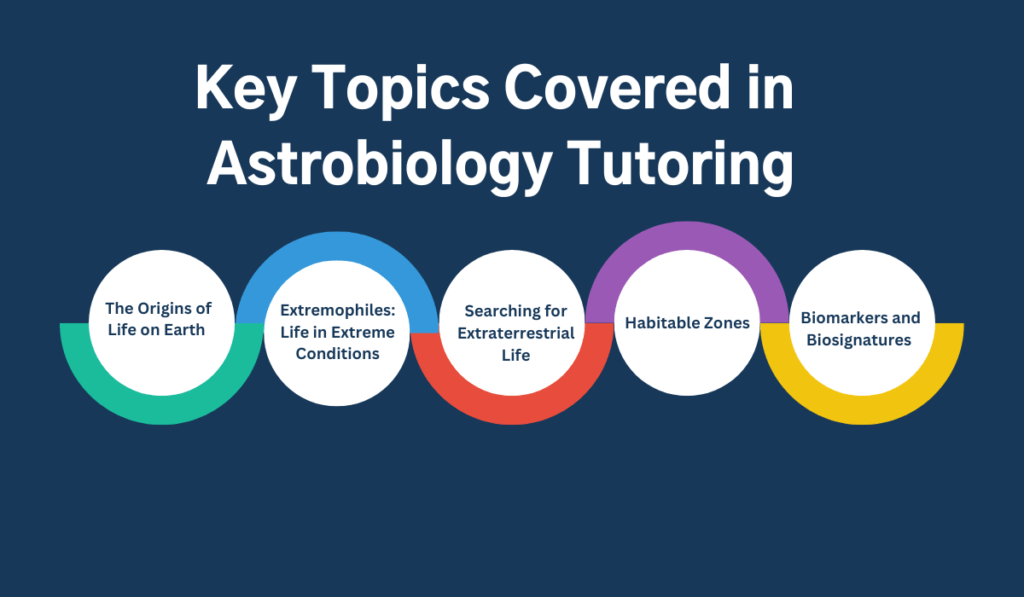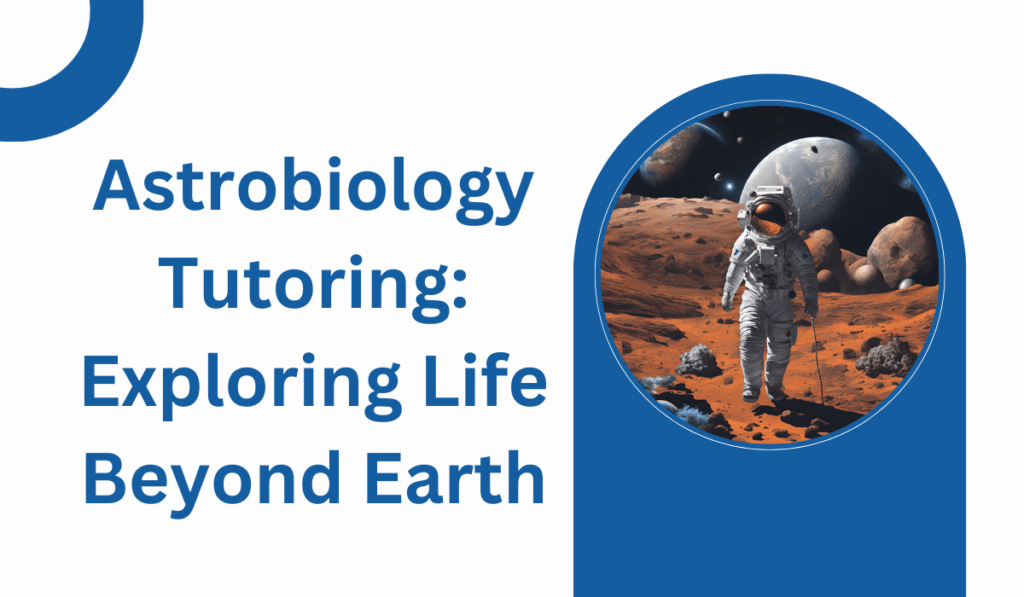Unlock the Wonders of Astrobiology with Expert Tutoring
Astrobiology, the intriguing study of life beyond Earth, combines biology, chemistry, physics, and astronomy to explore one of humanity’s most profound questions: Are we alone in the universe? This interdisciplinary field examines the origins, evolution, and potential distribution of life across the cosmos.
For students eager to delve into this exciting subject, astrobiology tutoring offers a unique opportunity. With expert guidance, you can gain a deeper understanding of the origins of life, the possibility of life on other planets, and the future of space exploration. Engaging with astrobiology not only satisfies curiosity but also inspires the next generation of scientists and space explorers. Enhance your learning experience and fuel your passion for the universe with personalized astrobiology tutoring.
What is Astrobiology?
Astrobiology is the study of the origin, evolution, distribution, and future of life in the universe. It involves understanding the conditions under which life can arise and survive, the possibility of life on other planets, and the implications of these findings for life on Earth.
Key Concepts in Astrobiology:
- Habitable Zones: Regions around stars where conditions might be right for life.
- Extremophiles: Organisms that thrive in extreme environments on Earth, offering clues about potential extraterrestrial life.
- Exoplanets: Planets outside our solar system that might harbor life.
Why Choose Astrobiology Tutoring?
Astrobiology tutoring offers personalized guidance to help students grasp complex concepts and stay up-to-date with the latest research. Here’s how it can benefit you:
Personalized Learning Approach:
- Tailored Lessons: Tutors can customize lessons to match your interests and learning pace.
- Interactive Sessions: Engaging, hands-on activities make learning more enjoyable and effective.
Academic and Career Advancement:
- Preparation for Advanced Studies: Tutors can help you build a strong foundation for higher education in astrobiology and related fields.
- Research Opportunities: Learn about current research projects and how to get involved.
Development of Critical Thinking Skills:
- Analyzing Data: Develop skills to analyze and interpret scientific data.
- Formulating Hypotheses: Learn to create and test hypotheses based on scientific evidence.
Key Topics Covered in Astrobiology Tutoring
1. The Origins of Life on Earth Understanding how life began on Earth can provide clues about how it might arise elsewhere. Key theories include the primordial soup hypothesis and the role of hydrothermal vents.
2. Extremophiles: Life in Extreme Conditions Study organisms that live in extreme environments, such as deep-sea vents, acidic lakes, and polar ice caps. These extremophiles help us understand the potential for life on other planets.
3. Searching for Extraterrestrial Life Learn about the methods and technologies used to search for life beyond Earth. This includes studying exoplanets, analyzing atmospheric biomarkers, and exploring moons like Europa and Enceladus.
4. Habitable Zones Explore the concept of habitable zones, or “Goldilocks zones,” where conditions might be just right for life. This includes understanding the factors that make a planet or moon habitable and identifying such regions in other solar systems.
5. Biomarkers and Biosignatures Delve into the study of biomarkers and biosignatures—indicators of life such as specific gases or organic molecules. Learn about the techniques used to detect these signs in the atmospheres of distant planets.
6. Exoplanets and Their Potential for Life Examine the discovery of exoplanets and their potential to support life. Discuss the methods used to find exoplanets, such as the transit method and radial velocity method, and evaluate their habitability based on various criteria.

Table: Astrobiology Key Concepts and Examples
| Concept | Description | Example |
|---|---|---|
| Habitable Zones | Regions around stars where conditions might support life | Earth’s position in the Solar System |
| Extremophiles | Organisms that thrive in extreme environments | Tardigrades, deep-sea vent organisms |
| Exoplanets | Planets outside our solar system | Kepler-186f, Proxima Centauri b |
| Biomarkers | Indicators of life, such as gases or organic molecules | Methane on Mars, oxygen in exoplanet atmospheres |
Current and Future Space Missions
Historical Missions:
- Viking Missions: The first missions to search for life on Mars.
- Voyager Probes: Provided valuable data on the outer planets and beyond.
Current Missions:
- Mars Rovers: Curiosity and Perseverance are exploring the Martian surface for signs of past life.
- James Webb Space Telescope: Set to launch soon, it will look for biomarkers in exoplanet atmospheres.
Future Missions:
- Europa Clipper: A mission to explore Jupiter’s moon Europa, which may have a subsurface ocean.
- Artemis Program: NASA’s plan to return humans to the Moon, with a focus on sustainable exploration and preparing for Mars missions.
The Interdisciplinary Nature of Astrobiology
Astrobiology is a multidisciplinary field that requires knowledge of various scientific disciplines. This integration makes it a rich and diverse area of study.
Fields Involved in Astrobiology:
- Biology: Understanding life forms and their adaptations.
- Chemistry: Studying the chemical processes that support life.
- Physics: Exploring the physical conditions of different environments.
- Earth and Planetary Sciences: Comparing Earth with other celestial bodies.
Collaboration Between Scientists and Institutions: Astrobiology involves collaboration between various organizations, including NASA, the European Space Agency (ESA), universities, and research institutions. These collaborations drive forward our understanding of life beyond Earth.
Benefits of Astrobiology Tutoring
Personalized Learning Approach:
- Customized Lessons: Tailored to meet your specific interests and academic needs.
- Interactive Learning: Engaging methods to enhance understanding and retention.

Academic and Career Advancement:
- Advanced Studies Preparation: Build a solid foundation for future academic pursuits.
- Research and Career Opportunities: Explore career paths in astrobiology and related fields.
Critical Thinking and Problem-Solving:
- Data Analysis: Learn to interpret complex scientific data.
- Hypothesis Formulation: Develop skills to create and test scientific theories.
Conclusion
Astrobiology tutoring offers an unparalleled opportunity to explore one of the most intriguing and dynamic fields of science. By delving into the study of life beyond Earth, students can significantly expand their knowledge base, develop robust critical thinking skills, and prepare themselves for exciting academic and career opportunities in astrobiology and related disciplines. Whether you’re deeply passionate about space exploration, curious about the potential for extraterrestrial life, or simply interested in understanding the broader questions of our existence, astrobiology tutoring can open up a world of discovery. By fostering a deeper understanding of the universe, astrobiology not only answers profound questions but also inspires the next generation of scientists and explorers to push the boundaries of human knowledge.
Relevant Pages on Tutorlinkers:
External Resources:
By exploring these resources and engaging in personalized tutoring, you can embark on an exciting journey to understand the mysteries of life beyond Earth.
Ehsan Ali is a seasoned content writer and researcher with a talent for translating complex concepts into clear, engaging content. With a deep understanding of human behavior, societal trends, and technical topics, Ehsan creates insightful and impactful content that resonates with a broad audience. His expertise ensures that each piece is both accessible and compelling, bridging the gap between intricate details and everyday understanding.





